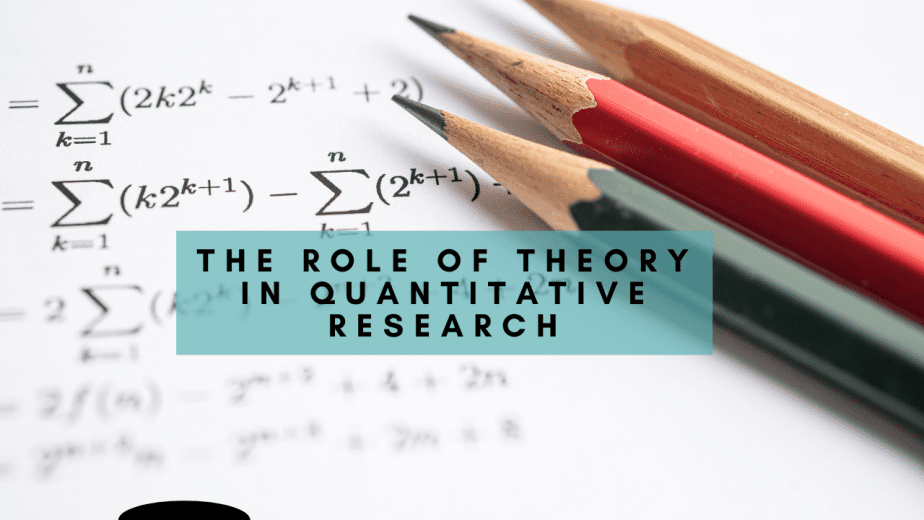Theory plays an important role in academic work. It is what differentiates academic work from consultancy work. In this article, I discuss the definition of theory, the purpose of theory in academic research, characteristics of a good theory, the difference between a theory and a hypothesis, and how to make theoretical contribution in quantitative research.
- What is a theory?
- The purpose of theory in academic research
- Characteristics of a good theory
- Concepts vs. constructs
- Theory vs. hypothesis
- The role of theory in quantitative research
- Making theoretical contribution in quantitative research
- Final thoughts on the role of theory in quantitative research
What is a theory?
Theories have been defined in various ways by different scholars:
“A theory is a set of propositions which help explain a certain phenomenon”
“A theory is a set of ideas which help explain things”
“A theory is a statement of concepts and how those concepts are related to each other”
“A theory shows how and why certain phenomena occur”
The purpose of theory in academic research
Theory helps researchers to:
- Explain the phenomenon under investigation.
- Understand the phenomenon under investigation.
- Predict the phenomenon under investigation.
- Challenge existing knowledge.
- Extend existing knowledge.
Characteristics of a good theory
There are many theories that scholars have come up with to explain their phenomena of study. Most phenomena or topics of study have more than one theory that try to explain them. How does a researcher/student know which theory is good or bad?
A good theory has the following characteristics:
- Useful: in the sense that it provides some guide for its users to understand the phenomenon they are investigating.
- Validated: a good theory has been validated and accepted widely by the scientific community.
- Internally consistent: a good theory has some consistency in explaining and predicting phenomena.
- Fit with data: a good theory should fit with known data and facts
- Testable: a good theory can be tested using existing data.
Concepts vs. constructs
It is important for researchers and PhD students to understand the difference between concepts and constructs.
A concept is an abstract idea whereas a construct converts the concept into something measurable.
Concepts are used in qualitative research while constructs are used in quantitative research.
Examples:
Adoption of technology = concept (cannot be measured quantitatively)
Degree of adoption of technology = construct (can be measured quantitatively)
In order to build a robust quantitative study that has strong theoretical foundations, a researcher must come up with well-conceived constructs.
Good constructs should be distinct: this will help the researcher clearly articulate the effect of a construct on other variables of the study.
Good constructs should also be defined in the context of existing literature.
The way constructs are defined will also influence how they will be measured.
Example:
Degree of adoption of technology as a construct will be measured differently from ease of adoption of technology as a different construct. These two constructs refer to two different aspects of adoption of technology so they will be measured differently.
Theory vs. hypothesis
A theory differs from a hypothesis in the following ways:
A theory has historical existence whereas a hypothesis does not: theories have been established and have existed over time after repeated observation and testing. On the other hand, a hypothesis is forward-looking in that it is a statement of what the researcher predicts will happen after carrying out the study.
A theory is broad and includes sets of assumptions, predictions, facts and laws. On the other hand, a hypothesis is specific and states what the researcher plans to test in his study.
Difference in context applied: a theory is applied in a broad context whereas a hypothesis is applied in very specific context.
Difference in acceptance: a theory is widely accepted in the scientific community whereas a hypothesis is speculative in nature that is yet to be tested.
The role of theory in quantitative research
In quantitative research, theory plays the following roles:
- Theories have their own sets of assumptions. A quantitative researcher is able to analyse the assumptions critically to see if they apply to his own context of study.
- Theories form the basis upon which research hypotheses are formulated.
- Theories help quantitative researchers to test the conditions or circumstances under which certain phenomena occur.
- Additionally, theories help quantitative researchers to test the mechanisms through which certain phenomena occur.
- Theories also help quantitative researchers to go beyond explaining a phenomenon to generalising it through testing of the theory to particular populations.
Making theoretical contribution in quantitative research
Making research contribution is important in academic research, especially at the PhD level.
Contribution is made if the researcher advances or extends people’s understanding of the phenomenon being investigated.
Contribution is only achieved if there is originality in what the researcher is doing, that is, by the researcher addressing what has not been done or what is not yet known about the phenomenon under investigation. This of course requires extensive reading and review of relevant and up-to-date literature.
There are different ways of making theoretical contribution:
- By adding value to the existing theory/theories.
- By advancing or extending the state of knowledge.
- By providing new relationships between the constructs that have been studied previously.
- By coming up with new constructs or developing constructs in a new way.
- By recommending the policy or practical implications of the new constructs or new relationships between previously-studied constructs.
Final thoughts on the role of theory in quantitative research
In conclusion, theory plays a significant role in academic research, in general, and in quantitative research in specific. Theory is especially important in PhD-level studies whose requirements entail the students making contribution to the body of knowledge. Quantitative studies should be strongly grounded on theories because it is the theories that will help the students develop the constructs and measurements for their studies.
Also read:

